Items
topic_interest is exactly
Black
-
 2022-05-19
2022-05-19Everything You Need to Know About DC Black Pride 2022
This is a news story from Metro Weekly by Joseph Reberkenny. For the first time since COVID started, DC Black Pride will be back in-person. It is organized by the Center for Black Equity and it includes over 25 events highlighting the Black LGBTQ community in Washington. During the height of the COVID outbreak, the Center for Black Equity held events online instead. The organizers say that in-person events are special for this community and has planned safety precautions for people attending. There will be things like masks available at the event in addition to rapid test kits. -
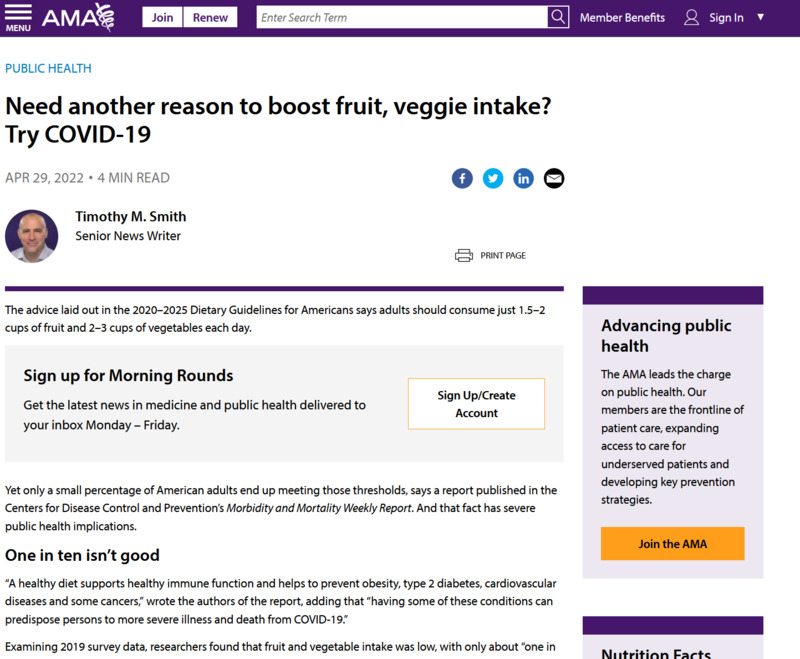 2022-04-29
2022-04-29Need another reason to boost fruit, veggie intake? Try COVID-19
This is a news story from the American Medical Association by Timothy M. Smith. Doctors mentioned in this article bring up the importance of diet and how it relates to fighting off COVID-19. According to a 2019 survey, researchers found only 1 in 10 adults meet the daily recommended intake of fruit and vegetables. There is a racial disparity as well. The researchers also noted that meeting vegetable intake recommendations was highest among those 51 or older. There were also differences in vegetable intake between groups defined by income level and race. While 12.2% of adults in the highest-income households got enough veggies, only 7.7% of those living in middle-income households did. Meanwhile, 6.9% of Black adults met vegetable intake recommendations, compared with 10.1% of white adults. Other barriers in getting the daily recommended intake have class issues, where some groups are more likely to have access to fresh food than other groups. “Perceived barriers to fruit and vegetable consumption include cost, as well as limited availability and access,” the report notes, adding that “for some persons, such barriers might have worsened during the COVID-19 pandemic related to economic and supply chain disruptions that could further limit ability to access healthier foods.” Dr. Kirley said she hopes the pandemic “will draw attention to this longstanding problem and that we’ll start to see more investment in innovative solutions to promote health through better nutrition.” With these things in mind, it demonstrates the barriers some people might have in fighting off COVID. -
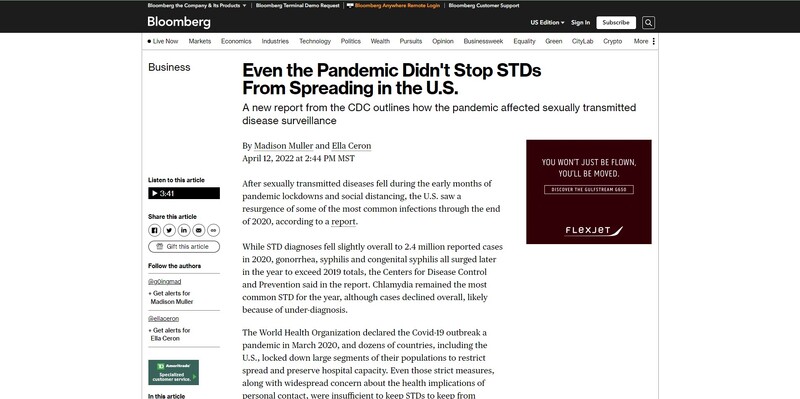 2022-04-12
2022-04-12Even the Pandemic Didn't Stop STDs From Spreading in the U.S.
This is a news story from Bloomberg by Madison Muller and Ella Ceron. According to recent reports, the overall amount of STDs went down with the lockdowns in early 2020, but then started to rise again near the end of 2020. Gonorrhea, syphilis and congenital syphilis all surged later in the year to exceed 2019 totals, the Centers for Disease Control and Prevention said in the report. Chlamydia remained the most common STD for the year, although cases declined overall, likely because of under-diagnosis. Possible reason why the numbers may be decreased for the beginning of 2020 might not be because of the lockdowns entirely. Some people in 2020 skipped doctor's appointments where they could have gotten diagnosed, in addition to resources being low during the height of the pandemic. Other trends included in this study are the rates of health insurance among certain demographics. Black people, in addition to LGBTQ people, are shown to have lower rates of having health insurance. -
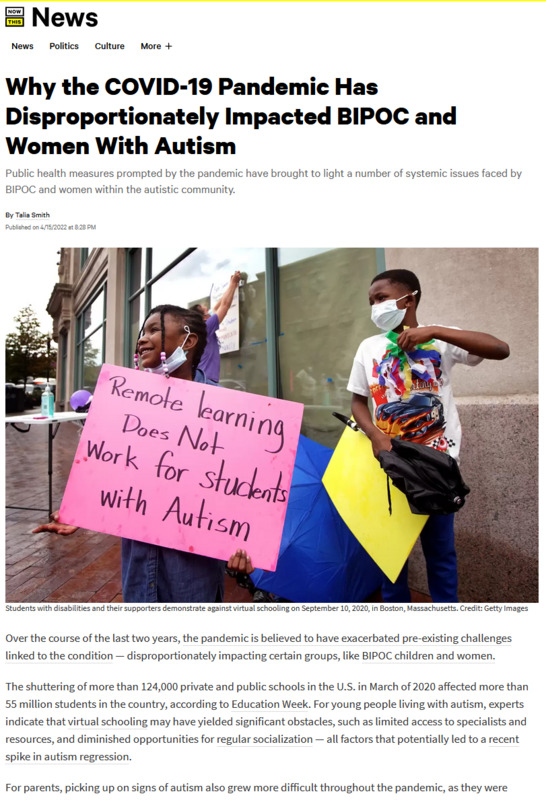 2022-04-15
2022-04-15Why the COVID-19 Pandemic Has Disproportionately Impacted BIPOC and Women With Autism
This is a news story from Now This News by Talia Smith. The author says that over the course of the pandemic, BIPOC and autistic women have been disproportionately affected. BIPOC parents who were not able to work remotely struggled to support their autistic children. One study led by the NIH analyzing the impact of the pandemic on BIPOC and low-income populations shows that families with a child living with autism witnessed an increase in sleep issues and behavioral problems, in addition to increased conflict between children and adults and the use of more severe disciplinary methods. In a study published in “Molecular Autism,” researchers revealed that for adults with autism, the pandemic brought relief from certain stressors like “sensory overload” and ultimately led to an “increase in solidarity.” -
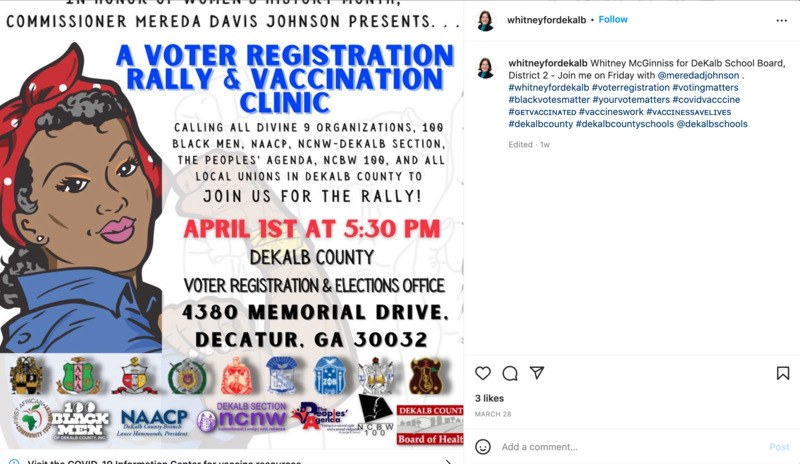 2022-03-28
2022-03-28A Voter Registration Rally & Vaccine Clinic
This is an Instagram post by whitneyfordekalb. This is an advertisement for people to attend a voter registration and vaccine clinic. It is calling on a few Black organizations in addition to unions to join the rally. Below are a few sponsors of the event. This event is in Georgia. -
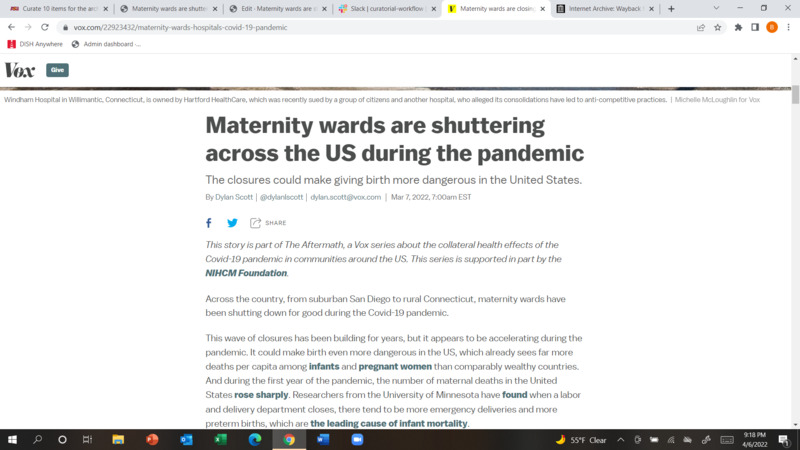 2022-03-07
2022-03-07Maternity wards are shuttering across the US during the pandemic
This is a news story from Vox, written by Dylan Scott. Across the nation, maternity wards have been shutting down, making things more dangerous for new mothers. Due to these closures, there has been an increased number in deaths of both infants and pregnant women. These losses of maternity wards have been harshest on those of low income, as well as Black and Hispanic women. Part of these closures have happened due to shortages of doctors, nurses, and other hospital staff during the pandemic. The closure of more maternity wards also means women having to travel further to get the care they need. The timing makes this even more difficult during labor, as complications can happen during that, increasing chances of death. Overall, this article shows the ways that the ripple effects from COVID not only affect the mortality rates of mothers and babies, but disproportionately hurt poor, Black, and Hispanic women. -
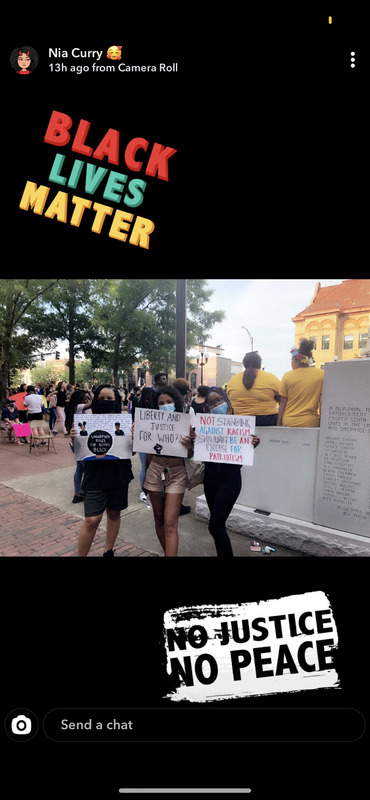 2020-06-04
2020-06-04Small Town, Big Affairs
The challenges of both COVID-19 and the lockdown illuminated the disproportionate burden black and brown communities have been facing with jobs, communities, and police. In the midst of the profound trauma of George Floyd's death, many communities had to come together to address what parameters were they enforcing for both the health and safety for its member. Many protest like the one shown in Anderson, South Carolina took place May-August of 2020 to demonstrate how a growing pandemic forced individuals to think about others' vulnerabilities--specifically those inflicted from police brutality. -
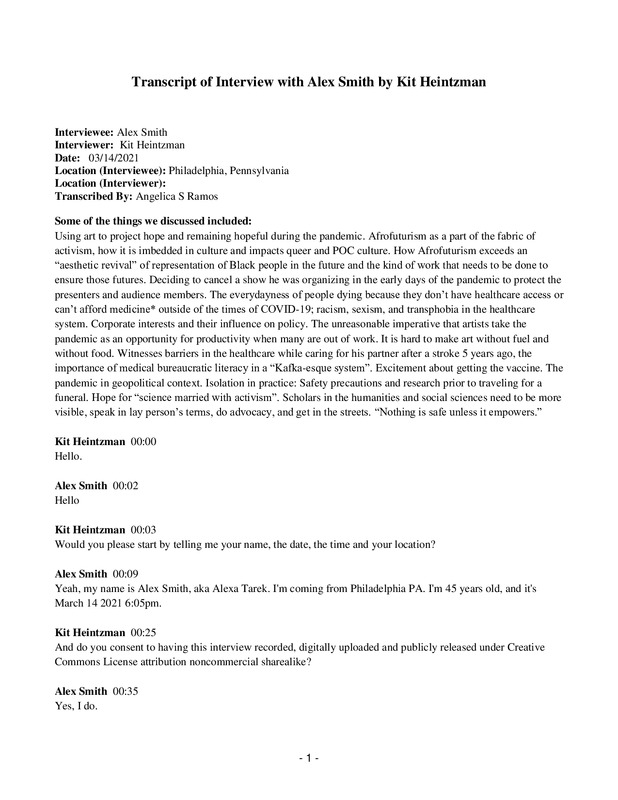 2021-03-14
2021-03-14Alex Smith Oral History, 2021/03/14
Self-description: “I’m an artist, writer, musician, and an off-and-on again activist, lecturer, worshopshop leader. I’m coming out of Philadelphia. My work revolves around concepts relating to Afrofuturism; for lack of a better term: superheroes and the conceptual nature of superheroes and the idea of the vigilante and the people’s champions and heroes can walk among us. I use [aesthetics and the immersive ideas of] from science fiction, cyberpunk, solarpunk, biopunk, and Afrofurturism to empower people of color, queer people and to project us into the future and our ideas and culture into the future as well. I use different mediums to do that, my bands Solarized (a sort of noisy punk rock band) and Rainbow Crimes (indie rock, but a little crazier and noisier than many excursions into that). I have written a short story collection called ARKDUST. And I do collage work and soundscapes and curate events like Laser Life, which was a queer sci-fi reading that me and my friends in a collective that I’m in called Metropolarity put together. That’s my praxis right now: a little bit of everything. I view my work as if I’m creating for 18 or 19 or 20 year old Alex, who probably needed some queer Black sci-fi in his life. So, I’m projecting these aspects of myself back to the past to not just nourish my community, but to nourish myself.” Personal website: alexoteric.com Other biographical details: Vegetarian, experiences depression, Pew Center for the Arts Fellow, during COVID is the first time in his life he’s had Health Insurance. Some of our discussion touched on: Using art to project hope and remaining hopeful during the pandemic. Afrofuturism as a part of the fabric of activism, how it is imbedded in culture and impacts queer and POC culture. How Afrofuturism exceeds an “aesthetic revival” of representation of Black people in the future and the kind of work that needs to be done to ensure those futures. Deciding to cancel a show he was organizing in the early days of the pandemic to protect the presenters and audience members. The everydayness of people dying because they don’t have healthcare access or can’t afford medicine* outside of the times of COVID-19; racism, sexism, and transphobia in the healthcare system.Corporate interests and their influence on policy. The unreasonable imperative that artists take the pandemic as an opportunity for productivity when many are out of work. It is hard to make art without fuel and without food. Witnesses barriers in the healthcare while caring for his partner after a stroke 5 years ago, the importance of medical bureaucratic literacy in a “Kafka-esque system”. Excitement about getting the vaccine. The pandemic in geopolitical context. Isolation in practice: Safety precautions and research prior to traveling for a funeral. Hope for “science married with activism”. Scholars in the humanities and social sciences need to be more visible, speak in lay person’s terms, do advocacy, and get in the streets. “Nothing is safe unless it empowers.” Other cultural references: Netflix, Zombie Movies, Sabrina the Teenage Witch, Oprah’s interview with Meghan Markle and Prince Harry, Black Panther, Teenage Bounty Hunter, Elon Musk, GoFundMe. A specific reference is made to the need for his sister’s sickle cell anemia medicine in this interview. She dies a few months later. The GoFundMe to cover funeral expenses can be found here: https://www.gofundme.com/f/memorial-fund-for-elizabeth-graham?utm_campaign=p_cp_url&utm_medium=os&utm_source=customer -
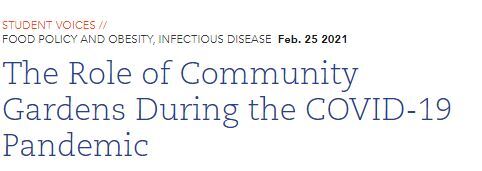 2021-02-25
2021-02-25The Role of Community Gardens During the COVID-19 Pandemic
The pandemic has brought the issues of food insecurity and the fragility of our food system to the forefront. This article discusses how household food insecurity disproportionately affects lower-income families and Black and Hispanic communities. Community gardens are one way to address these issues, providing mental health benefits, social and emotional support, and public health benefits during the pandemic. -
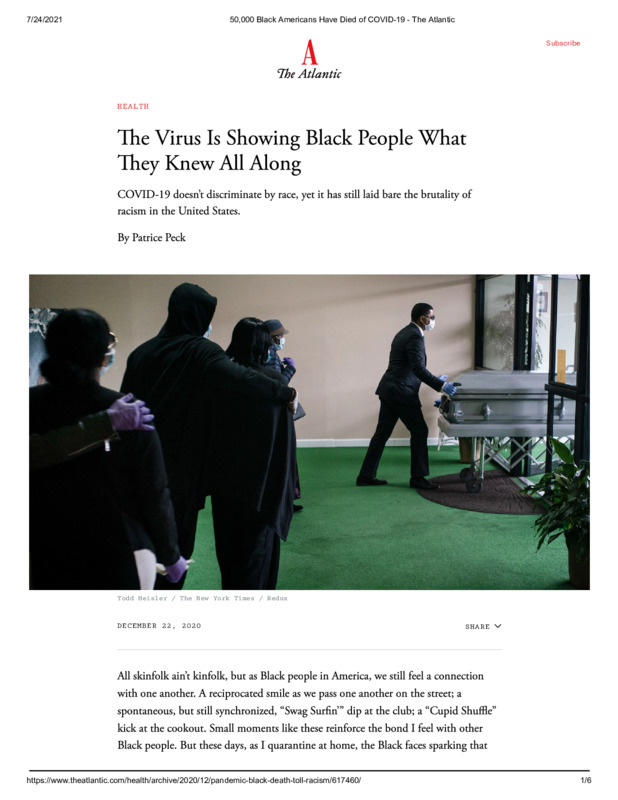 2020-12-22
2020-12-22The Virus Is Showing Black People What They Knew All Along
In this article, author Patrice Peck discusses how black Americans are dying of COVID-19 at 1.7 times the rate of whites. In her words "19,000 Black people would still be alive if not for systemic racism." -
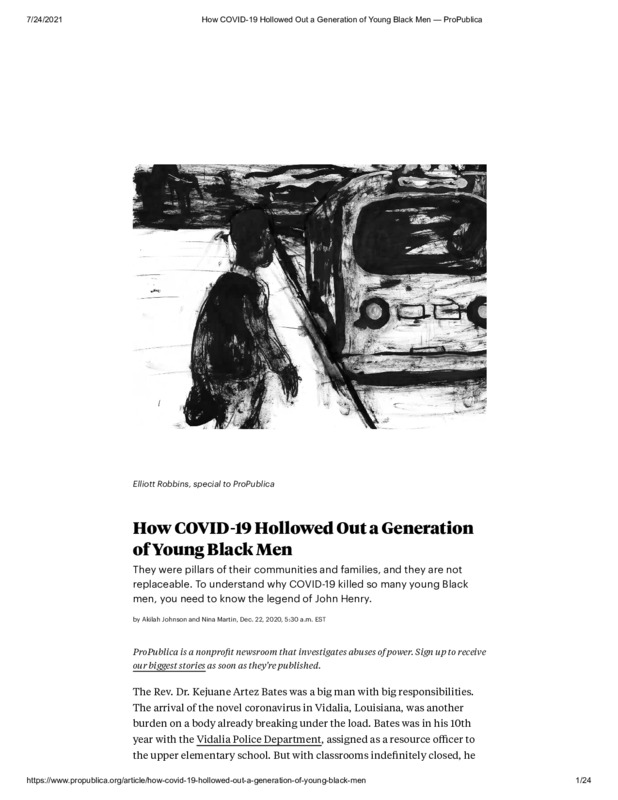 2020-12-22
2020-12-22How COVID-19 Hollowed Out a Generation of Young Black Men
This is a fascinating and heartbreaking article about the struggles of young black men and health inequity brought to light by COVID-19. The difficulties of systemic racism are costing young black men their lives. -
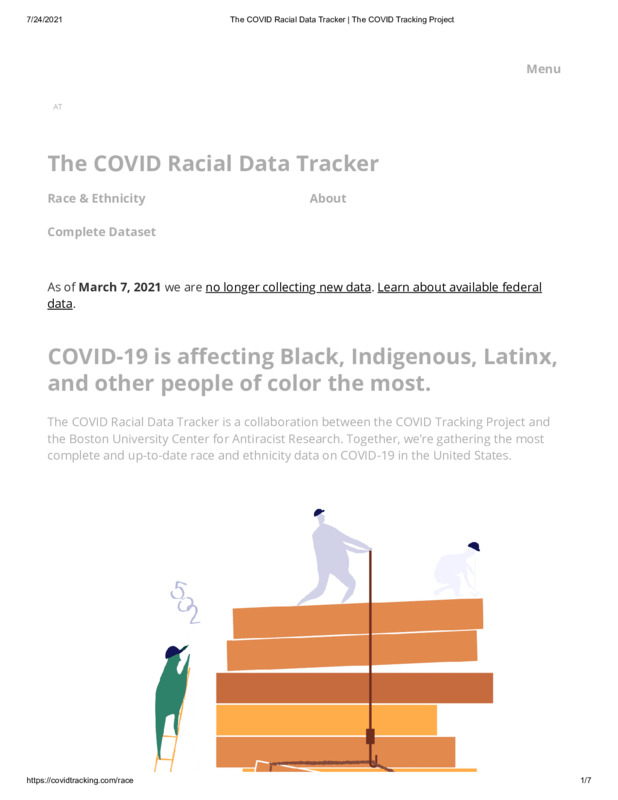 2021-03-07
2021-03-07The COVID Racial Data Tracker
This data tracker showed how Covid-19 disproportionately affected black, Latinx, and indigenous communities. -
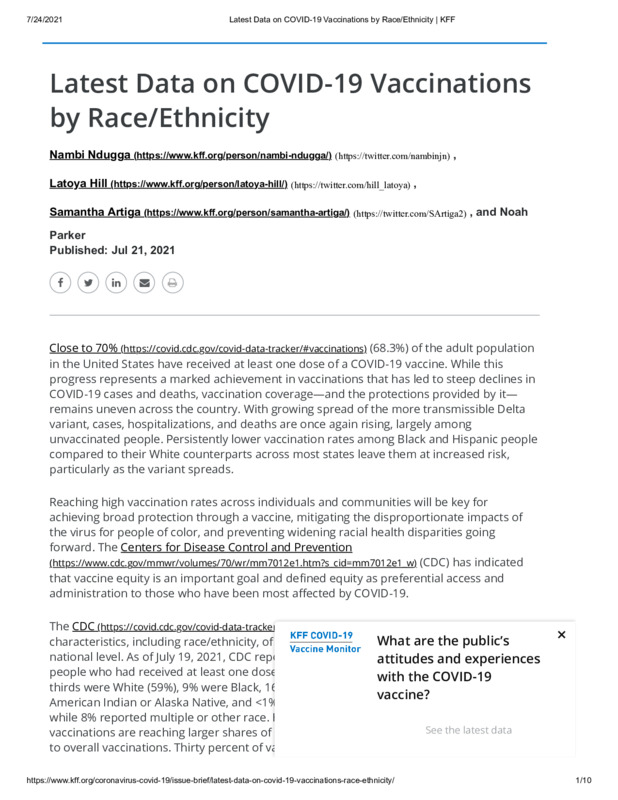 2021-07-21
2021-07-21Latest Data on COVID-19 Vaccinations by Race/Ethnicity
This is an analysis of equity in vaccine distribution. The data shows a disparity between whites and Asians (whose vaccination rates were equal to or higher than their case counts) and black, Latino, Native American, and Native Hawaiians (whose vaccination rates were generally lower than their case counts). In recent weeks, however, these numbers seem to be improving. -
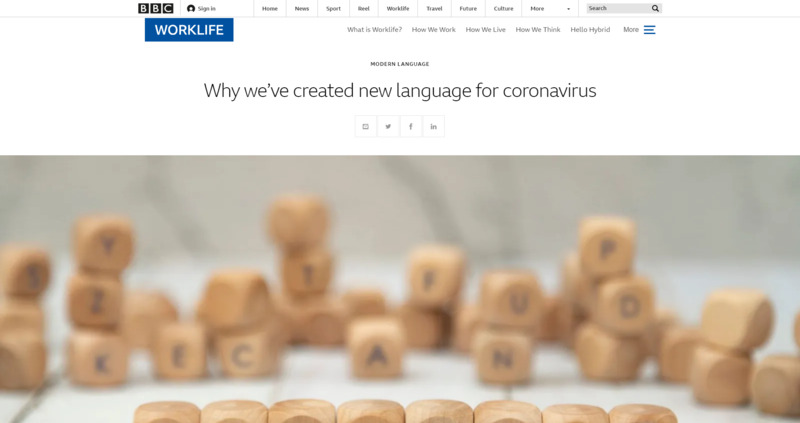 2020-05-24
2020-05-24Why We've Created New Language for Coronavirus
Language is ever evolving, and an event such as the COVID-19 pandemic has certainly led to new words and phrases in the English language and to new definitions for existing words and phrases. It remains to be seen which words that were coined during the pandemic will survive long-term and which ones will remain in a dictionary rather than in regular usage. This article, describing the English language from the British Broadcasting Corporation (BBC), describes changes in British, Indian, Canadian, and Australian English during these pandemic times. It discusses the speed of the linguistic change brought about by the pandemic and the coining of new words and phrases and new definitions of existing words and phrases. -
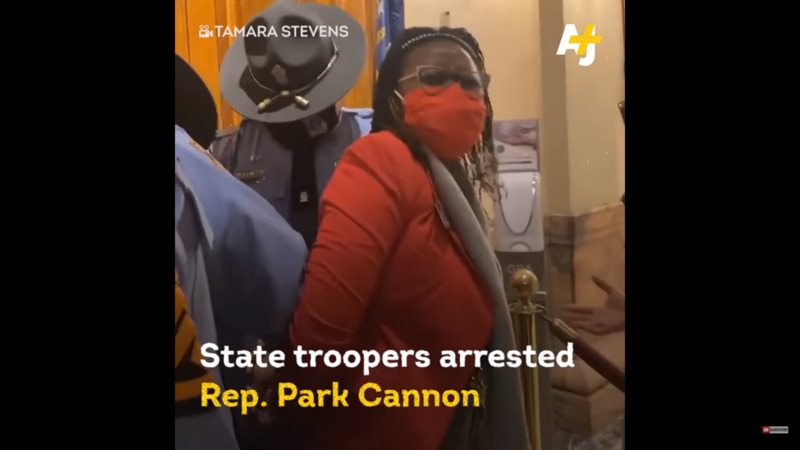 2021-03-26
2021-03-26Black Lawmaker Arrested For Knocking On Governor’s Office Door
State troopers arrested a Georgia lawmaker who was knocking on Gov. Brian Kemp’s office door, in protest of the closed-door signing of a bill that would restrict voter access. Critics, including Rep. Park Cannon, say the new laws will disenfranchise Black and Democratic voters. “I am not the first Georgian to be arrested for fighting voter suppression. I’d love to say I’m the last, but we know that isn’t true.” -
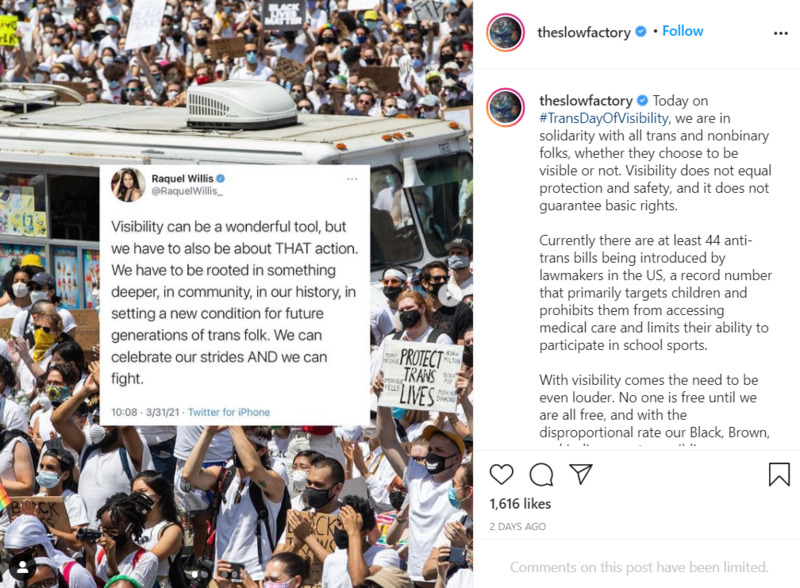 2021-04-01
2021-04-01Transgender Day of Visibility
Today on #TransDayOfVisibility, we are in solidarity with all trans and nonbinary folks, whether they choose to be visible or not. Visibility does not equal protection and safety, and it does not guarantee basic rights. Currently there are at least 44 anti-trans bills being introduced by lawmakers in the US, a record number that primarily targets children and prohibits them from accessing medical care and limits their ability to participate in school sports. With visibility comes the need to be even louder. No one is free until we are all free, and with the disproportional rate our Black, Brown, and Indigenous trans siblings experience violence, both physically and judicially, we must commit to ending the systems that allow the systemic barriers and hatred to endure. For more resources, actionable steps and donations, follow: @raquel_willis @chasestrangio @glits_inc @mpjinstitute @transjusticefp @intransitive.ar @tko_alabama @mattxiv @jmaseiii #transdayofvisibility #tdov2021 -
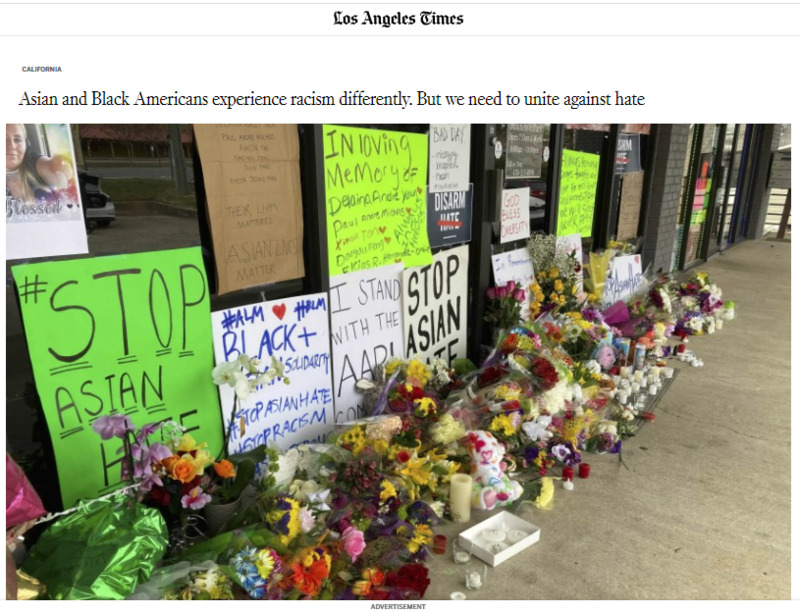 2021-03-23
2021-03-23"Asian and Black Americans experience racism differently. But we need to unite against hate"
In this editorial in the Los Angeles Times, Black female staff writer Sandy Banks poses the question "Now the question is: Can we join together and move forward, with white supremacy — not each other — as the enemy?" She reflects on the years of tension in Los Angeles between the Black and Asian American communities. However, she sees a common ground between the two communities in light of the anti-Asian racism and shooting of six Asian women at the hands of a White male, whose crimes were justified by a police spokesperson who was found later to have made anti-Asian social media posts. -
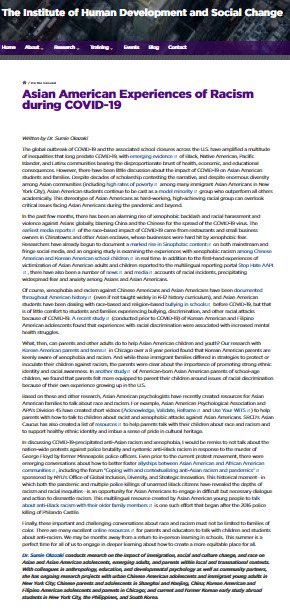 2020
2020Asian American Experiences of Racism during COVID-19
Over the past few months, the rise in xenophobic actions, racism, and violence against the AAPI community have been on the rise. Mainstream and fringe social media have perpetuated stereotypes and have scapegoated Asians as the cause of COVID-19. This rise in race and ethnically motivated hate happens alongside police brutality and anti-Black racism. Educators and parents should educate themselves and open conversations with their children and students about anti-racism. -
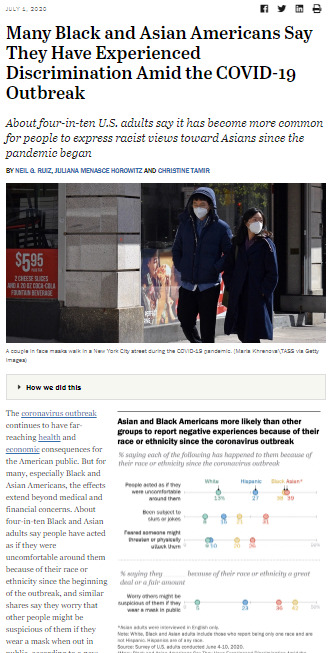 2020-07-01
2020-07-01Many Black and Asian Americans Say They Have Experienced Discrimination Amid the COVID-19 Outbreak
About four-in-ten U.S. adults say it has become more common for people to express racist views toward Asians since the pandemic began. Asian and Black Americans are more likely than other groups to report negative experiences because of their race or ethnicity since the COVID-19 outbreak began. -
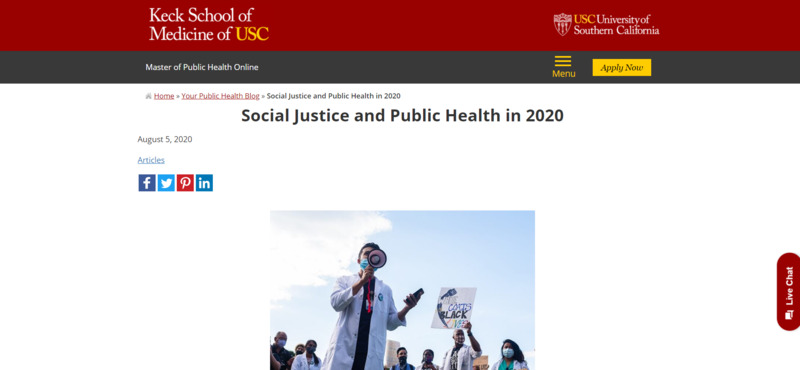 2020-08-05
2020-08-05Social Justice and Public Health in 2020
From the article: The COVID-19 pandemic, caused by the spread of the novel coronavirus, has created an unexpected and unprecedented lifestyle shift for many people across the globe. Several months into the pandemic, the public has been exposed to a number of issues they might not have previously considered or thought possible, from hospitals rapidly reaching capacity and the lack of personal protective equipment (PPE) to the mental and social challenges of physical distancing and being quarantined. -
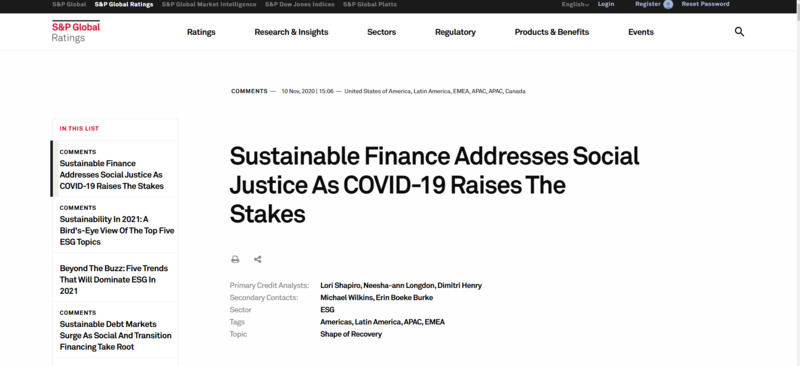 2020-11-10
2020-11-10Sustainable Finance Addresses Social Justice As COVID-19 Raises The Stakes
From the article: Economic shocks from the pandemic have widened existing inequities around the world, leading to calls for greater social justice in dealing with this health threat. Poorer people, minorities, and women are suffering disproportionately from growing health, housing, income, and education gaps under measures to contain COVID-19 that could set them back for years to come. To fund programs to address the problem, governments, supranationals, and corporations, among others, have accelerated issuance of sustainable instruments--including social bonds, where issuance jumped nearly four times so far this year to US$71.9 billion from the 2019 level. We think the sustainable debt market, partly because of the rapid rise in social bond issuance, could exceed $500 billion this year. -
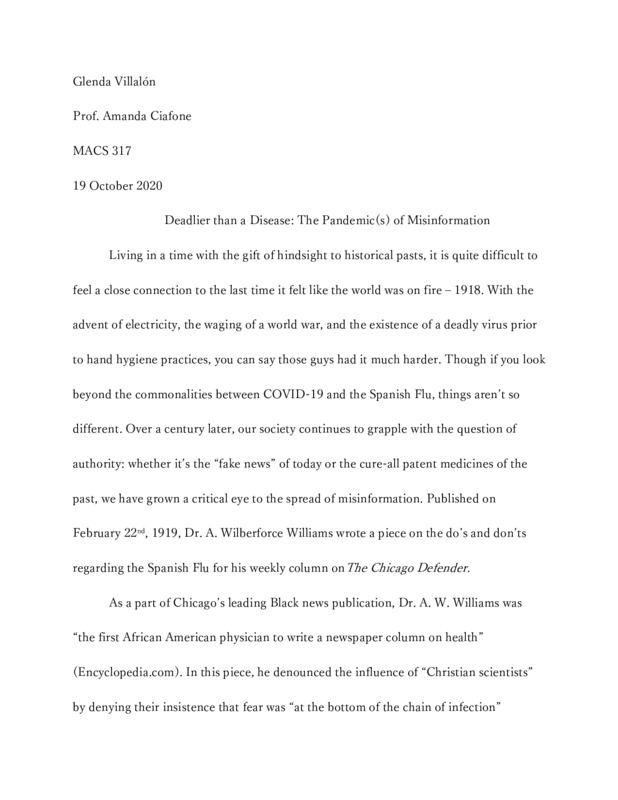 1919-02-22
1919-02-22Deadlier than a Disease: The Pandemic(s) of Misinformation
This piece brings to light the persistence in human ability to question authority. The "tar cures" of yesterday are scarily similar to the presidential suggestions to "inject bleach" today. To me, this piece brings a sense of comfort; just knowing that the people of 1918 had their share of pseudo-scientific authority figures to dodge and denounce just as we do in 2020. -
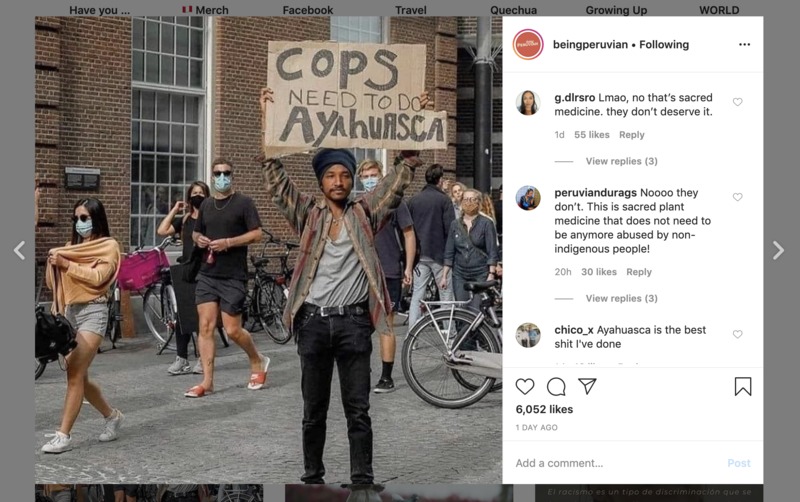 2020-06-03
2020-06-03Cops need to do ayahuasca
Image of a black man holding a sign saying "Cops need to do ayahuasca," referring to the recent protest over George Floyd, which has also sparked conversations about race worldwide. In Peru, social media accounts are posting memes, statements, and declarations against racism and the current situation in the U.S.
